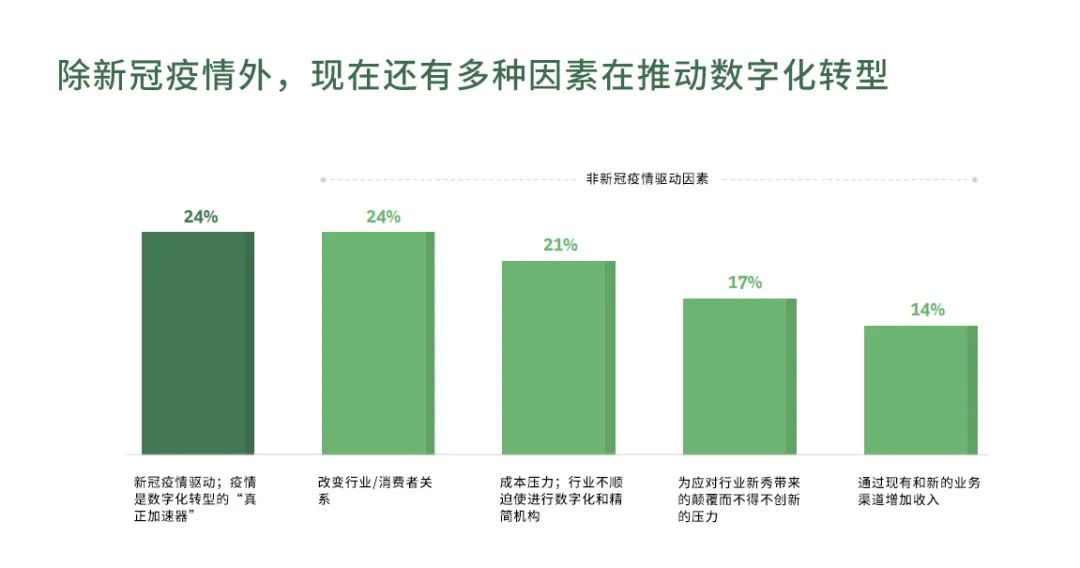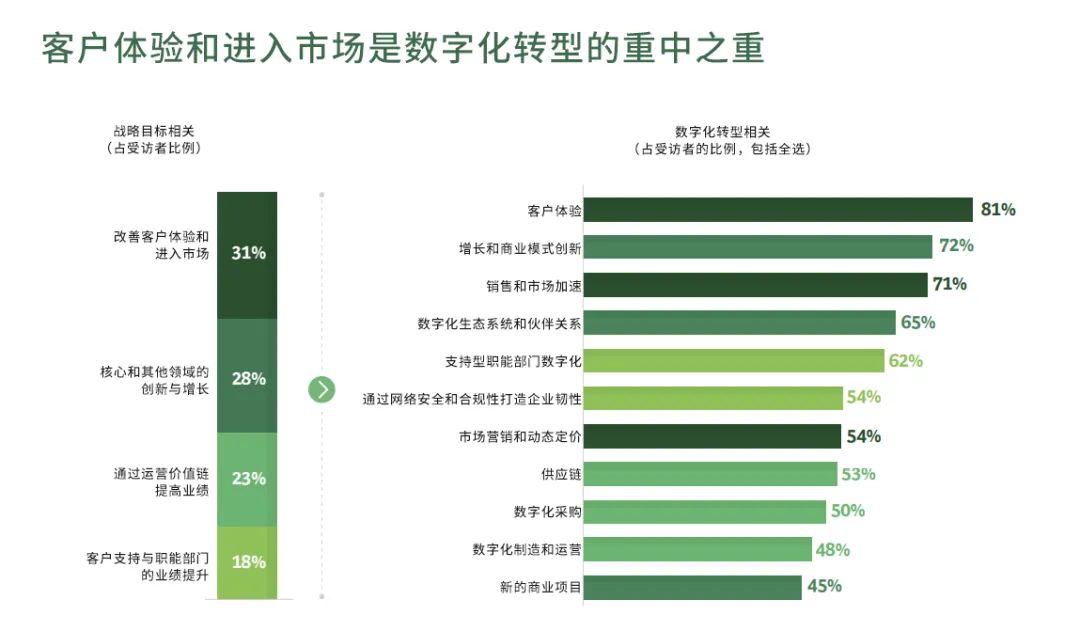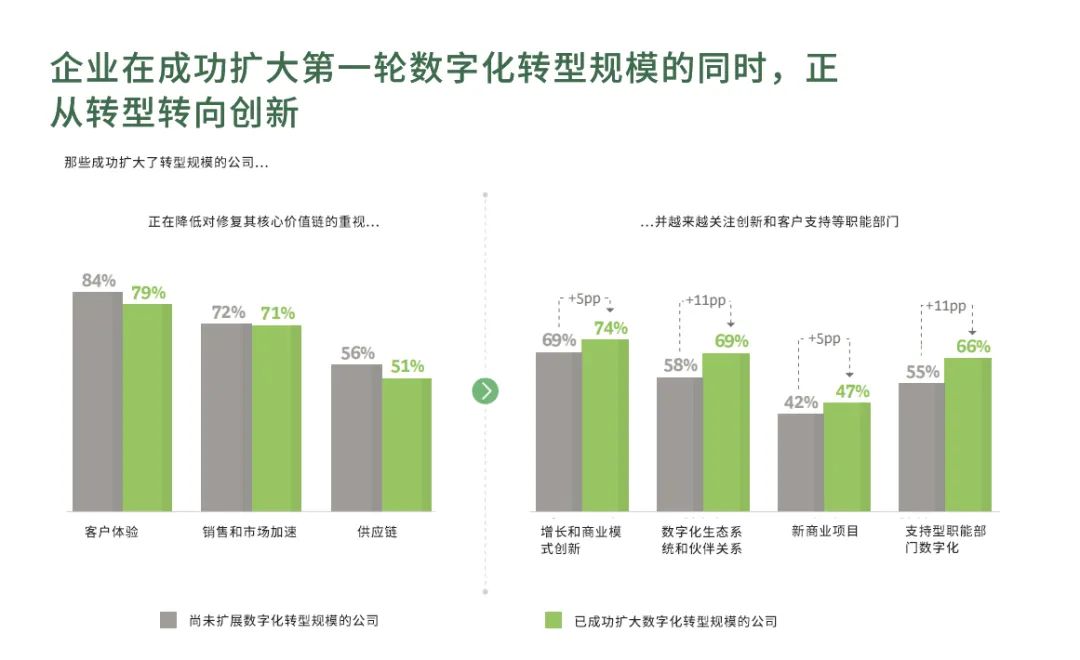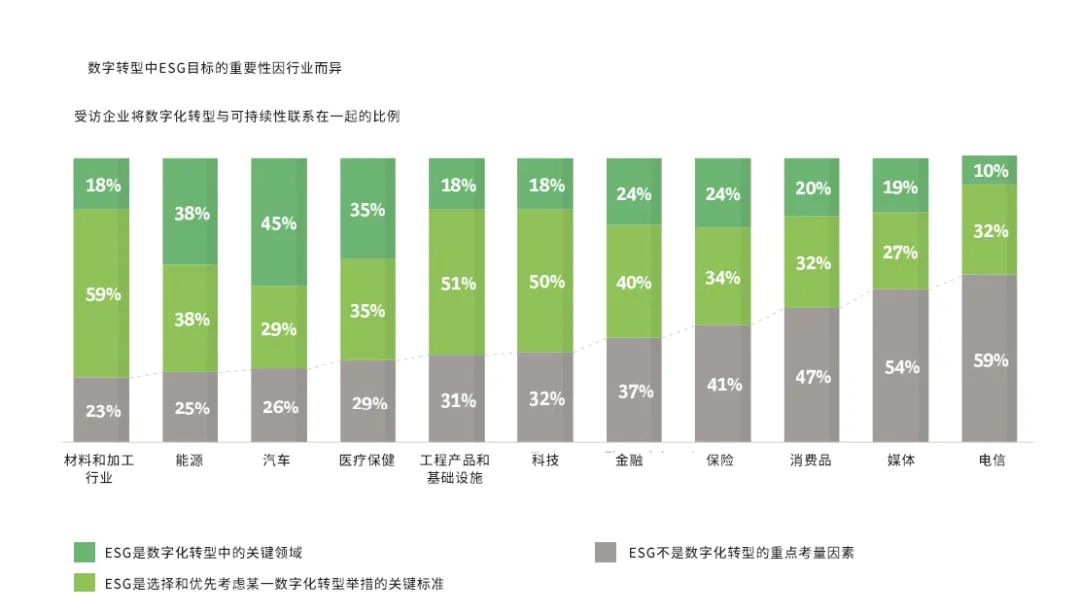2022-01
Introduction:The Rewards of Digital Transformation, Not Just Performance
Source: Internet synthesisAuthor: Xiao BianClick:1351
Since the outbreak of the epidemic, for enterprises, the high-frequency word mentioned is "digital transformation". Digital transformation has helped some companies successfully cope with the challenges of offline office stagnation and supply chain disruption, and its advantages are not only online office in special times, but the benefits it brings to enterprises, such as profit growth and efficiency improvement, are gradually increasing. recognized by the enterprise.
It's a tacit fact of every leader that a successful digital transformation can bring huge rewards to the business. However, not all companies that execute digital transformation strategies are able to successfully achieve their transformation goals.
Not long ago, BCG (Boston Consulting Group) released the "2021 Global Digital Transformation Survey", which focuses on the return of successful digital transformation, the reasons for the persistent gap in transformation success rate, and the adjustment strategy of enterprises' focus during transformation. According to the survey report, only 35% of companies have achieved their digital transformation goals in 2021, entering the next stage of large-scale transformation from digital to cross-departmental and cross-regional. Moreover, the difference between companies that successfully achieve their digital transformation goals and others is not just a short-term substantial increase in profits, but more in broader, sustainable changes such as customer experience, operational efficiency, innovation-driven business growth, etc.
How can enterprises reverse the backward situation of digital transformation? In the report, BCG analyzed the six elements of successful digital transformation, strategic goals, and focus shifts, which may be useful for you.
Internal reference
Performance and innovation are the rewards of digital transformation
Six elements of success
What is a successful digital transformation for a business? Improving profits is only the most basic, and more important is to have a continuous change effect on the enterprise, so that it can obtain a virtuous circle: on the one hand, it will successfully solve individual problems; on the other hand, it will be able to promote new technologies and new ways of working in various departments. and mass adoption in the region.
When companies focus their digital transformation on six key success factors, the odds of a successful transformation can be greatly improved. The six key elements are:
- A comprehensive strategy with clear transformation goals. The strategy includes the why, what and how of the transformation, each of which is linked to specific, quantifiable business outcomes.
- Leader input from CEO to middle management. There is a very high consensus among business leaders and they actively participate in the transformation, which also includes the active participation and sense of responsibility of middle managers.
- Deploy high-quality talent. Management unleashes talent potential and deploys the most capable talent to drive transformation initiatives.
-Flexible and agile governance thinking to promote broader thinking changes. Leaders solve problems quickly, adapt to changing environments, and drive a cross-functional, task-oriented, "fail-to-fail" mindset change on a larger scale. So that each individual tackles individual challenges without losing sight of the larger collective purpose.
- Effectively monitor progress towards the achievement of established outcomes. Companies establish clear metrics and goals around processes and outcomes, and ensure that there is sufficient, available, high-quality data.
- A business-led modular technology and data platform. Build a modern technology architecture driven by business needs and aligned with enterprise goals for secure and scalable performance, rapid change deployment, and seamless ecosystem integration.
Compared to other factors, people are more confident in developing a good transformation strategy, but leadership issues are not adequately addressed, as is the case with most digital transformation “unsuccessful” companies today. Compared with 2020, companies have seen the least improvement in finding and deploying high-quality talent. This is not only because of the shortage of digital talent, but also because companies and industries with weaker relevant capabilities have difficulty attracting and retaining digital talent.
In addition, the main obstacles for many traditional organizations are in terms of agile governance, results monitoring and technology modularization - the inability to effectively carry out cross-functional work and achieve end-to-end business results, resulting in wasted time, energy, and resources.
Transformation is increasingly focused on strategic priorities
As the impact of the pandemic gradually changes, the main drivers of digital transformation are also changing. At the height of the epidemic in 2020, 83% of enterprises said that they sounded the alarm for their digital transformation to accelerate; the latest survey conducted between May and July 2021 showed that 24% of enterprises still regard the epidemic as their main concern. The main driver of digital transformation, and 76% of companies have shifted their focus to transforming relationships between industries and customers, increasing productivity, generating revenue, and fostering innovation as one of their key strategies.

Source: BCG Global Digital Transformation Survey, 2021
That said, businesses today look to digital transformation to achieve a broad set of strategic goals. While the focus of transformation will vary significantly by industry, in general, these priorities can be grouped into four broad categories of strategic objectives:
■ Improve customer experience and market entry
■ Innovation and growth in core and other business areas
■ Improve performance through the operational value chain
■ Customer support and functional performance improvement

Source: BCG Global Digital Transformation Survey, 2021
From digital transformation to digital-led innovation at scale
For companies that have successfully scaled their digital transformation in the first round, the focus is clearly shifting from digital transformation to enhancing innovation capabilities.
These companies used the first wave of digital transformation to solve the most important fundamental problems in their core business: digitally redesigning the customer experience and processes in sales and marketing channels, and using digital solutions to drive increased productivity. These companies are now shifting their focus from repairing their core value chains (customer experience, product manufacturing, and supply chain) to focusing on innovation—whether it's core or new. The advantages of companies that have successfully digitally transformed are being consolidated: as they leverage their digital skills to innovate better and faster, the gap between them and their lagging competitors will grow.

Source: BCG Global Digital Transformation Survey, 2021
Companies that have successfully scaled digitally also tended to expand their focus beyond the core value chain to include functions such as HR and finance. For these enterprises, the first round of digital transformation is the key foundation. They have begun to enter a state of continuous innovation, and have gradually embarked on the road of coordinated development of people and systems—the organic combination of new technologies and people provides innovation and advantages , growth, efficiency and corporate resilience.
ESG has become the focus of transformation for some companies
Environmental, social and governance (ESG) goals are quickly becoming a major priority for some industries in their digital transformation. The latest survey shows that more than 60% of companies surveyed cite ESG factors as their main focus or key criteria for selecting and prioritizing digital initiatives. However, this varies by industry - the most focused ESG targets are materials and processing industries, automotive, energy, etc., many of which are energy-intensive industries, so reducing emissions and achieving sustainable green development become their digitization Transformation focus. In addition, there is the healthcare industry, because of the ongoing social impact of the industry.

Source: BCG Global Digital Transformation Survey, 2021
And even in industries where the link between ESG and digital is relatively weak, companies that have successfully undergone digital transformation are significantly different from other companies – companies that have successfully digitally transformed are almost as likely to have ESG as a priority. twice that of other companies.
Epilogue
We are in a global race for the speed of digitization. The rewards for successful digital transformation in customer experience, employee engagement, and financial improvements are enormous; more importantly, these companies are optimizing and increasing the impact of their digital capabilities—continuously improving their digital mindset and implementing digital ways of working , and drive continuous improvement. This is the watershed between companies, and a successful transformation is expected to help companies make better use of current and future breakthrough technologies and seize opportunities to develop, rather than stick to the rules and try to resist the impact of future industry innovators.
DISCLAIMER: THIS ARTICLE IS FROM THE INTERNET AND DOES NOT REPRESENT THE OPINIONS OF 鹏盛资本PENGSCPA. 鹏盛资本PENGSCPA DO NOT GUARANTEE THE ACCURACY OR COMPLETENESS OF THE ARTICLE, WHICH IS FOR YOUR REFERENCE ONLY. IF ANYONE SUFFERS DIRECT, INDIRECT OR RELATED LOSSES DUE TO THE USE OF THE MATERIALS IN THIS ARTICLE, 鹏盛资本PENGSCPA WILL NOT BE LIABLE FOR SUCH LOSSES.